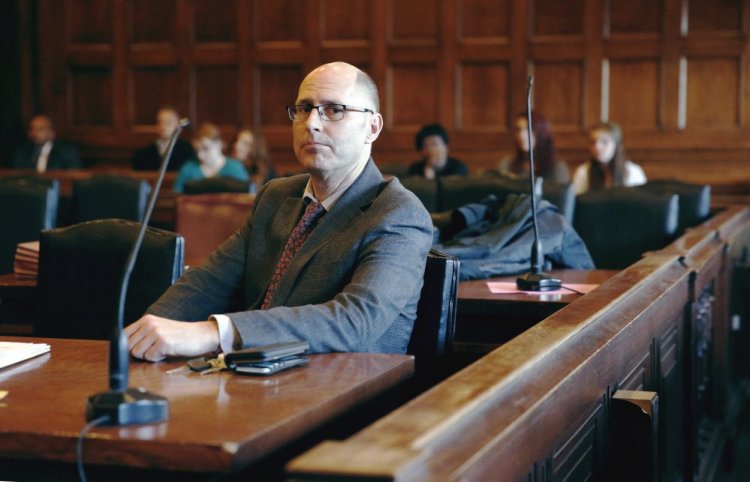A Cumberland County Superior Court judge has rejected a Portland landlord’s motion for a new trial on a safety code violation related to a deadly apartment building fire in 2014.
Gregory Nisbet was acquitted of six manslaughter charges filed against him after an accidental fire in his Noyes Street apartment house killed six people. However, he was found guilty of a misdemeanor fire code violation because the building lacked secondary exits from the third-floor bedrooms, and that conviction led to a three-month jail sentence that Nisbet has yet to serve.
Nisbet is expected to file appeals of the conviction and sentence in the wake of the 10-page ruling denying a new trial that Superior Court Justice Thomas Warren issued Friday.
The Nov. 1, 2014, fire was the city’s deadliest in four decades. It started in a plastic receptacle for cigarette butts on the front porch of 20 Noyes St., one side of a three-story duplex, and spread quickly. There were no working smoke detectors and flames blocked a stairwell that might have allowed occupants to escape.
The victims were Nicole “Nikki” Finlay, 26; David Bragdon Jr., 27; Ashley Thomas, 29; Maelisha Jackson, 23, of Topsham; Steven Summers, 29, of Rockland; and Christopher Conlee, 25, of Portland. Bradgon, Finlay and Thomas were tenants, and Jackson, Summers and Conlee were visiting the house for a Halloween party.
Warren found Nisbet not guilty of the manslaughter charges. Although Warren said the landlord had failed to maintain the building and inspect the smoke detectors, he also said the state hadn’t proved beyond a reasonable doubt that the victims would have survived if not for Nisbet’s failure to take those steps.
After the fire, the city set up a new Housing Safety Office, hired more inspectors and required landlords to register their units and pay an annual fee. The unusual manslaughter trial of a landlord was closely watched in the community and was seen as a warning for other landlords.
In seeking a new trial, or dismissal of the conviction, Nisbet’s lawyers argued to Warren that the state failed to turn over a memo issued by the state Fire Marshal’s Office clarifying the code for using windows to satisfy a requirement for a secondary means of escaping from a fire. The memo had said some allowances were made for older buildings, but windows still had to meet minimum size standards to be considered secondary exits – and the windows on the third floor of the Noyes Street building didn’t meet those minimum dimensions and were too small for someone to climb out.
The decision against a new trial does not rule out an appeal of Nisbet’s conviction or his sentence. Nisbet’s lawyer, Matthew Nichols, said Monday that it’s “highly likely” appeals of Warren’s ruling, the verdict and the sentence will be filed with the Maine Supreme Judicial Court within three weeks.
Nisbet has not yet served any time because the motion for a new trial or dismissal has been pending since just after Warren’s verdict in October 2016. Nichols said he will file papers this week to try to keep his client out of jail while appeals are pursued. Otherwise, Nisbet would have to report to jail by the end of this week, he said. Such motions are usually granted.
Convictions can be overturned if prosecutors fail to turn over evidence that might have affected the outcome of the trial. However, Warren pointed out in his ruling that even Nisbet’s lawyer did not argue that the third-floor windows met the fire marshal’s standards as outlined in the 2013 memo, issued a year before fire. Warren said that the existence of the memo, even if it had been disclosed to defense lawyers before the trial, “is not sufficient to undermine confidence in the court’s verdict.”
He said that’s the legal standard for determining whether the evidence that wasn’t turned over is “material” to the outcome.
Warren said the memo didn’t surface before the trial most likely because the focus of the case at that point was on the much more serious manslaughter charges, along with a dispute over whether to classify the Noyes Street building as an apartment building or rooming house. There are different fire code requirements for buildings depending on their use.
The memo was turned over to prosecutors by the Fire Marshal’s Office on the third day of the week-long trial, but there are differing memories about when the document was given to defense lawyers.
Warren said the memo was available to the public and that defense lawyers could have learned of it from another source before the trial. And finally, Warren said, prosecutors said they turned it over to defense lawyers before the trial had reached the stage where testimony on code requirements was introduced.
Nisbet was sentenced to three months in jail and fined $1,000 for the code violation. He could have been sentenced to up to six months in jail, with the maximum $1,000 fine. His lawyers had argued that it was unprecedented for a landlord to go to jail for a building code violation.
Lisa Mazziotti of Westbrook, whose daughter, Nikki Finlay, died in the fire, said she was pleased by the ruling, but is frustrated with the slow pace of the legal process and the fact that Nisbet has not yet gone to jail.
“For me, this is crazy,” she said. “I’m waiting for justice and I don’t seem to get anywhere.”
Edward D. Murphy can be contacted at:
emurphy@pressherald.com
Send questions/comments to the editors.



